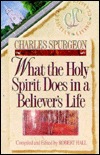- Bíblia
- Leia a Bíblia
- Versões da Bíblia
- Verso do dia
- Planos de Leitura
- Versos por Tópico
- Books of the Bible
- Imagens bíblicas
- Estude
- Comentários
- Concordâncias
- Dicionários
- Enciclopédias
- Sermões
- Bible Atlas & Maps
- BP Wiki
- Devocionais
- Devocionais de hoje
- Light of the World
- Todos os devocionais
- Inspirational Quotes
- Mais
- Picture Quotes
- Videos
- Inspirador
- Estudo da Bíblia
- O que a Bíblia diz
- Bible Q&As
- Daily Bread
- Bible by Genre
- Bible Stories
- Random Bible Verse
- Comunidade
- Store
As one of the greastest expository preachers of all time, Charles Spurgeon is eminently qualified to teach on the role of the Holy Spirit in a believer's life. The amazing success of his thirty-eight-year metropolitan ministry in the city of London during the 1800s was said to have been unparalleled in England since the days of Whitefield and Wesley.
Spurgeon credited his success to the powerful work of the Holy Spirit. He firmly believed that the spiritual transformations that occurred throughout the book of Acts were only the beginning of the mighty works the Holy Spirit intends to do. Declaring that Pentecost was not the pinnacle of the church's experience but only the first unveiling of what could and should happen, Spurgeon called upon believers to receive and live up to the full potential of the Holy Spirit.
Life-changing messages await you. Spurgeon's teaching is so solidly biblical, so understandable, so passionate, so wonderfully visual, and so practical that one cannot help but be inspired and challenged.
Spurgeon credited his success to the powerful work of the Holy Spirit. He firmly believed that the spiritual transformations that occurred throughout the book of Acts were only the beginning of the mighty works the Holy Spirit intends to do. Declaring that Pentecost was not the pinnacle of the church's experience but only the first unveiling of what could and should happen, Spurgeon called upon believers to receive and live up to the full potential of the Holy Spirit.
Life-changing messages await you. Spurgeon's teaching is so solidly biblical, so understandable, so passionate, so wonderfully visual, and so practical that one cannot help but be inspired and challenged.
Paperback, 192 pages
Published January 1st 1999 by Y W A M Pub
Se inscrever
© 2025 Bibleportal.com Todos os direitos reservados.

C.H. Spurgeon (1834 - 1892)
Spurgeon quickly became known as one of the most influential preachers of his time. Well known for his biblical powerful expositions of scripture and oratory ability. In modern evangelical circles he is stated to be the "Prince of Preachers." He pastored the Metropolitan Tabernacle in downtown London, England.His church was part of a particular baptist church movement and they defended and preached Christ and Him crucified and the purity of the Gospel message. Spurgeon never gave altar calls but always extended the invitation to come to Christ. He was a faithful minister in his time that glorified God and brought many to the living Christ.
Charles Haddon Spurgeon was England's best-known preacher for most of the second half of the nineteenth century. In 1854, just four years after his conversion, Spurgeon, then only 20, became pastor of London's famed New Park Street Church (formerly pastored by the famous Baptist theologian John Gill).
The congregation quickly outgrew their building, moved to Exeter Hall, then to Surrey Music Hall. In these venues Spurgeon frequently preached to audiences numbering more than 10,000 - all in the days before electronic amplification.
In 1861 the congregation moved permanently to the new Metropolitan Tabernacle.
... Show more